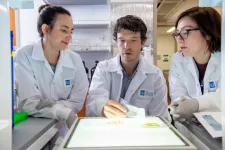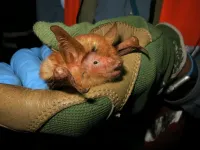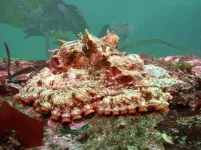INFORMATION:
Funding for this study came from the Nicholas Institute for Environmental Policy Solutions at Duke University, Walton Family Foundation (2018-1371), The David and Lucile Packard Foundation (2019-68336), The Gordon and Betty Moore Foundation (GBMF5668.02), Erling-Persson Foundation and the Swedish Research Council (2015-743, 2014-5246)
CITATION: "The Ocean 100: Transnational Corporations in the Ocean Economy," J. Virdin, T. Vegh, J.B. Jouffray, R. Blasiak, S. Mason, H. Österblom, D. Vermeer, H. Wachtmeister and N. Werner. Jan. 13, 2021, Science Advances. DOI: 10.1126/sciadv.abc8041
'Ocean 100': Small group of companies dominates ocean economy
Concentrated economic power may give policymakers leverage
2021-01-13
(Press-News.org) DURHAM, N.C. - Most of the revenues extracted from use of the world's oceans is concentrated among 100 transnational corporations, which have been identified for the first time by researchers at Duke University and the Stockholm Resilience Centre at Stockholm University.
Dubbed the "Ocean 100," these "ocean economy" companies collectively generated $1.1 trillion in revenues in 2018, according to research published Wednesday in the journal Science Advances. If the group were a country, it would have the world's 16th-largest economy, roughly equivalent to the gross domestic product (GDP) of Mexico.
"Now that we know who some of the biggest beneficiaries from the ocean economy are, this can help improve transparency relating to sustainability and ocean stewardship," said lead author John Virdin, director of the Ocean and Coastal Policy Program at Duke's Nicholas Institute for Environmental Policy Solutions. "The small number of companies that dominate these industries likely reflects high barriers to entry in the ocean economy. A lot of expertise and capital are needed to operate in the sea, both for the established industries and emerging one such as deep-sea mining and marine biotechnology."
The researchers studied eight core industries in the ocean economy: offshore oil and gas, marine equipment and construction, seafood production and processing, container shipping, shipbuilding and repair, cruise tourism, port activities and offshore wind. The 100 largest companies took an estimated 60 percent of the $1.9 trillion in revenues generated by these industries in 2018, the most recent year analyzed.
Offshore oil and gas dominated the Ocean 100 list with a combined revenue of $830 billion. The only corporation from outside that industry to make the top 10 is the Danish shipping company A.P. Møller-Mærsk at No. 9.
The researchers found a consistent pattern across all eight industries of a small number of companies accounting for the bulk of revenues. On average, the 10 largest companies in each industry took 45 percent of that industry's total revenue. The highest concentrations were found in cruise tourism (93 percent), container shipping (85 percent) and port activities (82 percent).
The authors write that this concentration presents both risks and opportunities.
"Senior executives of these few, but large companies, are in a unique position to exercise global leadership in sustainability," said co-author Henrik Österblom, science director at the Stockholm Resilience Centre. "The fact that these companies are headquartered in a small number of countries also illustrates that concerted actions by some governments, could rapidly change how the private sector interacts with the ocean."
The Ocean 100 builds on the concept of "keystone actors" developed by Österblom and his colleagues at the centre in a 2015 paper published in the journal PLOS ONE. Using keystone species in ecosystems as an analogy, the researchers identified a handful of corporations that dominate the global seafood industry. The study led to the formation of the Seafood Business for Ocean Stewardship (SeaBOS) initiative as a way to connect scientists with industry leaders to work toward more sustainable seafood production.
Virdin became interested in whether the keystone actor concept could be applied more broadly while advising governments on integrated ocean development and management policies for the ocean economy, or sometimes called the blue economy. The Ocean 100 study expands interdisciplinary research conducted into the blue economy topic by Duke scholars across the university, including Virdin and co-author Daniel Vermeer.
"Oceans will be increasingly central to the global economy in the 21st century," said Vermeer, executive director of the Center for Energy, Development and the Global Environment (EDGE) at Duke's Fuqua School of Business. "One of our biggest challenges is to sustain healthy ocean ecosystems as economic use increases and climate impacts accelerate. This study confirms that a relatively small number of companies will be central to this challenge, and have a real opportunity for leadership."
ELSE PRESS RELEASES FROM THIS DATE:
Robotic swarm swims like a school of fish
2021-01-13
Schools of fish exhibit complex, synchronized behaviors that help them find food, migrate and evade predators. No one fish or team of fish coordinates these movements nor do fish communicate with each other about what to do next. Rather, these collective behaviors emerge from so-called implicit coordination -- individual fish making decisions based on what they see their neighbors doing.
This type of decentralized, autonomous self-organization and coordination has long fascinated scientists, especially in the field of robotics.
Now, a team of researchers at the Harvard John A. Paulson School of Engineering and ...
Researchers identify nanoparticles that could deliver therapeutic mRNA before birth
2021-01-13
Philadelphia, January 13, 2021--Researchers at Children's Hospital of Philadelphia and the School of Engineering and Applied Science at the University of Pennsylvania have identified ionizable lipid nanoparticles that could be used to deliver mRNA as part of fetal therapy. The proof-of-concept study, published today in Science Advances, engineered and screened a number of lipid nanoparticle formulations for targeting mouse fetal organs and has laid the groundwork for testing potential therapies to treat genetic diseases before birth.
"This is an important first step in identifying nonviral mediated approaches for delivering cutting-edge therapies before birth," said co-senior author William H. Peranteau, MD, an attending surgeon in the Division of ...
New insights into the control of inflammation
2021-01-13
PHILADELPHIA -- (Jan. 13, 2021) -- Scientists at The Wistar Institute discovered that Early Growth Response 1 (EGR1), a protein that turns on and off specific genes during blood cell development, inhibits expression of pro-inflammatory genes in macrophages. As part of their function to protect the body against pathogens, macrophages play a major role in initiation, maintenance, and resolution of inflammation. The discovery expands the understanding of how macrophages are set off and deactivated in the inflammatory process, which is critical in many normal and pathological conditions. These findings were published online in the journal Science Advances.
"By deepening the understanding of the role of EGR1, we ...
COVID-19 vaccine creates incentive to improve our health
2021-01-13
COLUMBUS, Ohio - While we wait for our turn to get vaccinated against SARS-CoV-2, we could - and probably should - use the time to make sure we bring our healthiest emotional and physical selves to the treatment, a new review of previous research suggests.
Ohio State University researchers reviewed 49 vaccine studies in humans dating back 30 years that document how stress, depression and poor health behaviors can negatively affect the body's immune response to vaccination, and how improving health factors can enhance that response.
The impaired immune responses tended to fall into three categories - interference with the ...
In new Skoltech research, 'e-nose' and computer vision help cook the perfect chicken
2021-01-13
Skoltech researchers have found a way to use chemical sensors and computer vision to determine when grilled chicken is cooked just right. These tools can help restaurants monitor and automate cooking processes in their kitchens, and perhaps one day even end up in your 'smart' oven. The paper detailing this research results, supported by a Russian Science Foundation grant, was published in the journal Food Chemistry.
How do you tell that chicken breast on your grill is ready for your plate? You probably look at it closely and smell it to make sure it is done the way you like it. However, if you are a restaurant chef or head cook at a huge industrial ...
Pivotal discovery in quantum and classical information processing
2021-01-13
Scientists tame photon-magnon interaction.
Working with theorists in the University of Chicago's Pritzker School of Molecular Engineering, researchers in the U.S. Department of Energy's (DOE) Argonne National Laboratory have achieved a scientific control that is a first of its kind. They demonstrated a novel approach that allows real-time control of the interactions between microwave photons and magnons, potentially leading to advances in electronic devices and quantum signal processing.
Microwave photons are elementary particles forming the electromagnetic waves that we use for wireless communications. On the other hand, magnons are the elementary particles forming what scientists call "spin waves" -- wave-like disturbances in ...
Nanotechnology prevents premature birth in mouse studies
2021-01-13
In a study in mice and human cells, Johns Hopkins Medicine researchers say that they have developed a tiny, yet effective method for preventing premature birth. The vaginally-delivered treatment contains nanosized (billionth of a meter) particles of drugs that easily penetrate the vaginal wall to reach the uterine muscles and prevent them from contracting. If proven effective in humans, the treatment could be one of the only clinical options available to prevent preterm labor. The FDA has recommended removing Makena (17-hydroxyprogesterone caproate), the only approved medicine for this purpose, from the market.
The study was published Jan. 13 in Science Translational Medicine.
There ...
Scientists discover new 'spectacular' bat from West Africa
2021-01-13
A group of scientists led by the American Museum of Natural History and Bat Conservation International have discovered a new species of a striking orange and black bat in a mountain range in West Africa. The species, which the researchers expect is likely critically endangered, underscores the importance of sub-Saharan "sky islands" to bat diversity. The species is described today in the journal American Museum Novitates.
"In an age of extinction, a discovery like this offers a glimmer of hope," said Winifred Frick, chief scientist at Bat Conservation International and ...
Resilience to climate change?
2021-01-13
With the impact of climate change increasing by the day, scientists are studying the ways in which human behavior contributes to the damage. A recent study at Walla Walla University, by a collaboration of researchers from Walla Walla University and La Sierra University, examined the effects of acidic water on octopuses, potentially bringing new insight into both how our activities impact the world around us, and the way that world is adapting in response.
The study, "Impact of Short- and Long-Term Exposure to Elevated Seawater PCO2 on Metabolic Rate ...
Tiny molecules with a big impact
2021-01-13
The human organism requires a variety of small molecules, such as sugars or fats, in order to function properly. The composition of these so-called metabolites and their interaction - the metabolism - varies from person to person and is dependent not only on external influences, such as nutrition, but also to a significant extent on natural variations in our genetic make-up. In an international study, scientists from the Berlin Institute of Health (BIH) and Charité - Universitätsmedizin Berlin joined forces with colleagues from the United Kingdom, Australia and the United States and discovered hundreds ...
LAST 30 PRESS RELEASES:
2026 Young Investigators: ONR celebrates new talent tackling warfighter challenges
Genetics help explain who gets the ‘telltale tingle’ from music, art and literature
Many Americans misunderstand medical aid in dying laws
Researchers publish landmark infectious disease study in ‘Science’
New NSF award supports innovative role-playing game approach to strengthening research security in academia
Kumar named to ACMA Emerging Leaders Program for 2026
AI language models could transform aquatic environmental risk assessment
New isotope tools reveal hidden pathways reshaping the global nitrogen cycle
Study reveals how antibiotic structure controls removal from water using biochar
Why chronic pain lasts longer in women: Immune cells offer clues
Toxic exposure creates epigenetic disease risk over 20 generations
More time spent on social media linked to steroid use intentions among boys and men
New study suggests a “kick it while it’s down” approach to cancer treatment could improve cure rates
Milken Institute, Ann Theodore Foundation launch new grant to support clinical trial for potential sarcoidosis treatment
New strategies boost effectiveness of CAR-NK therapy against cancer
Study: Adolescent cannabis use linked to doubling risk of psychotic and bipolar disorders
Invisible harms: drug-related deaths spike after hurricanes and tropical storms
Adolescent cannabis use and risk of psychotic, bipolar, depressive, and anxiety disorders
Anxiety, depression, and care barriers in adults with intellectual and developmental disabilities
Study: Anxiety, gloom often accompany intellectual deficits
Massage Therapy Foundation awards $300,000 research grant to the University of Denver
Gastrointestinal toxicity linked to targeted cancer therapies in the United States
Countdown to the Bial Award in Biomedicine 2025
Blood marker from dementia research could help track aging across the animal world
Birds change altitude to survive epic journeys across deserts and seas
Here's why you need a backup for the map on your phone
ACS Central Science | Researchers from Insilico Medicine and Lilly publish foundational vision for fully autonomous “Prompt-to-Drug” pharmaceutical R&D
Increasing the number of coronary interventions in patients with acute myocardial infarction does not appear to reduce death rates
Tackling uplift resistance in tall infrastructures sustainably
Novel wireless origami-inspired smart cushioning device for safer logistics
[Press-News.org] 'Ocean 100': Small group of companies dominates ocean economyConcentrated economic power may give policymakers leverage





